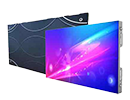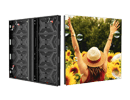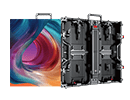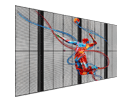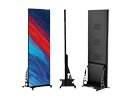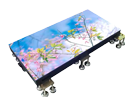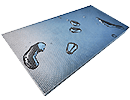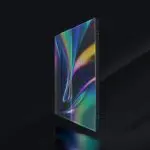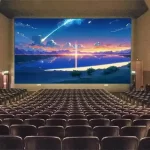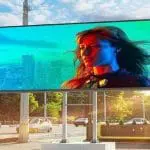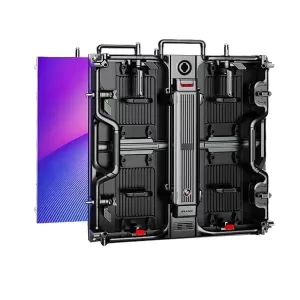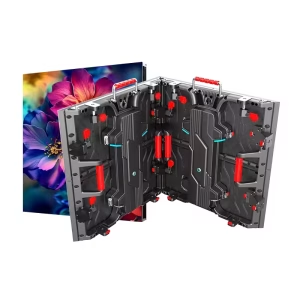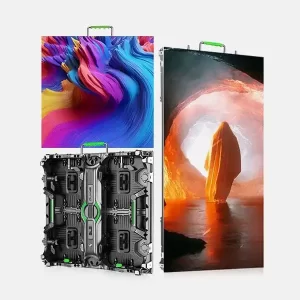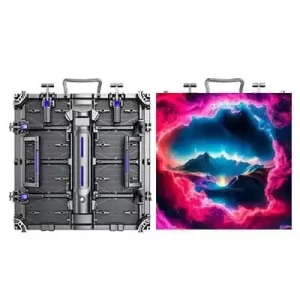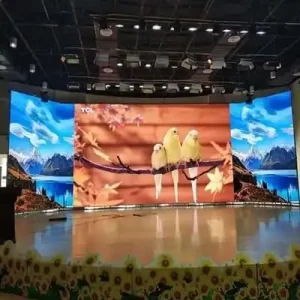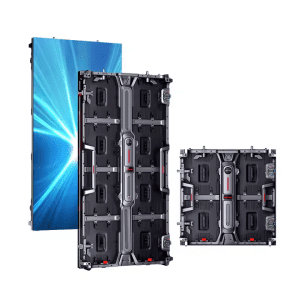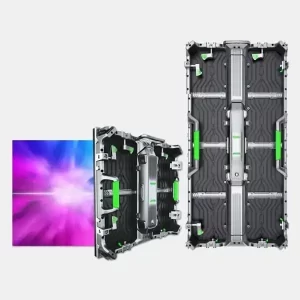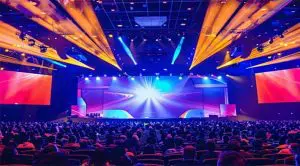Large stage LED display screens are essential for concerts, theater productions, corporate events, and live broadcasts, creating unforgettable visual experiences that captivate audiences. However, designing and implementing such screens requires careful consideration of performance requirements, installation logistics, and technical capabilities.
Here’s a comprehensive solution for large stage LED display screens, covering everything from design considerations to technology and operations.
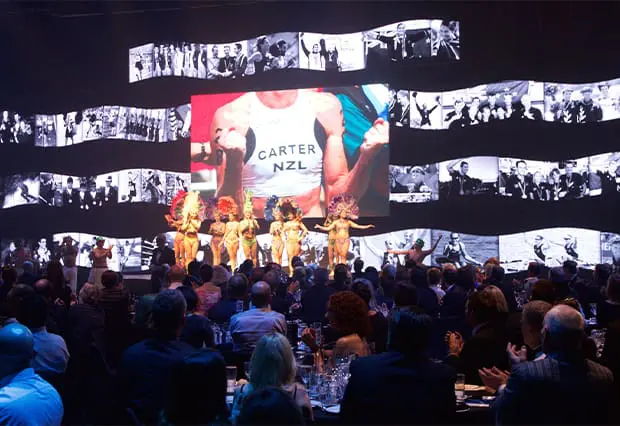
1. Key Requirements for Large Stage LED Display Screens
To provide an optimal solution, the following factors must be prioritized:
1.1 High Resolution and Pixel Pitch
- Why It Matters:
- For indoor large stages, the audience may be seated close to the screen, requiring a fine pixel pitch for clear visuals.
- For outdoor stages, the audience is farther away, so a larger pixel pitch is sufficient.
- Solution:
- Indoor Stages: Use P1.56–P3.91 pixel pitch for high-definition visuals.
- Outdoor Stages: Use P2.604–P4.81 pixel pitch for long-distance visibility.
1.2 Brightness and Contrast
- Why It Matters:
- High brightness ensures visibility under strong stage lighting or daylight (for outdoor events).
- High contrast enhances color vibrancy and clarity.
- Solution:
- Indoor Screens: Brightness of 1000–1500 nits is sufficient.
- Outdoor Screens: Brightness of 5000–7000 nits is required to counteract sunlight.
- Use high contrast ratio (≥5000:1) for vivid visuals, especially for video content.
1.3 Modular Design for Flexibility
- Why It Matters:
- Large stage screens often need to be transported, assembled, and disassembled for different events.
- Solution:
- Modular LED panels with quick-lock mechanisms for fast installation and dismantling.
- Lightweight die-cast aluminum cabinets for easy handling and transportation.
1.4 Seamless Display
- Why It Matters:
- A large screen must be visually seamless to avoid distracting gaps or misalignments.
- Solution:
- Use precision-engineered panels that fit together tightly.
- Ensure high refresh rates (≥1920Hz) to deliver flicker-free visuals, especially for live broadcasts.
1.5 Durability and Reliability
- Why It Matters:
- Stage screen performance must remain stable during long performances and under demanding conditions (e.g., heat, humidity, impact during transport).
- Solution:
- Use premium LED chips (e.g., Nationstar, Cree) for long-lasting brightness and color consistency.
- Ensure IP68 waterproofing for outdoor screens and dustproof designs for indoor screens.
- Include redundant power supplies and data connections to prevent failures during performances.
1.6 Effective Heat Management
- Why It Matters:
- Large screens generate significant heat during operation, which can damage components or reduce lifespan.
- Solution:
- Use aluminum cabinets with built-in heat dissipation systems (e.g., fans or natural convection).
- Ensure proper ventilation at the installation site.
1.7 Versatility for Creative Configurations
- Why It Matters:
- Stage designs often demand non-rectangular or creative screen layouts to match the event’s visual theme.
- Solution:
- Use curved LED panels, spherical displays, or custom shapes for creative installations.
- Opt for flexible LED screens to create wave-like or irregular designs.
1.8 Compatibility with Stage Systems
- Why It Matters:
- Seamless integration with stage lighting, sound systems, and control software ensures a cohesive production.
- Solution:
- Use LED screens compatible with DMX control systems, video processors, and media servers for synchronized operation.
- Include real-time content playback capabilities for live events.
2. Recommended Technical Specifications
| Feature | Indoor LED Screen | Outdoor LED Screen |
|---|---|---|
| Pixel Pitch | P1.56–P3.91 | P2.604–P4.81 |
| Brightness | 1000–1500 nits | 5000–7000 nits |
| Refresh Rate | ≥7680Hz | ≥7680Hz |
| Contrast Ratio | ≥5000:1 | ≥5000:1 |
| Cabinet Material | Die-cast aluminum | Die-cast aluminum |
| IP Rating | IP52 | IP68 |
| Viewing Angle | ≥160° horizontal, ≥140° vertical | ≥160° horizontal, ≥140° vertical |
| Maintenance | Front or rear access | Front or rear access |
| Operating Temperature | -30°C to +70°C | -40°C to +80°C |
3. Solution Components for Large Stage LED Screens
A successful large stage LED display solution involves multiple components working together seamlessly:
3.1 LED Panels
- Modules: High-quality LED modules with precise pixel alignment.
- Cabinets: Lightweight, durable die-cast aluminum cabinets.
3.2 Video Processor
- Converts and adjusts input signals for optimal display quality.
- Features include color correction, scaling, and multi-window display.
3.3 Control System
- Software for managing screen content, brightness, and synchronization with other stage systems.
- Compatible with real-time video feeds and multimedia playback.
3.4 Power Supply
- Stable, high-efficiency power supplies to ensure consistent performance.
- Redundant systems prevent power outages during critical performances.
3.5 Mounting and Rigging
- Modular mounting systems for floor-standing or hanging installations.
- Rigging systems designed for adjustable angles and secure fastening.
4. Installation and Maintenance Solutions
4.1 Fast Installation
- Use quick-lock systems for fast and secure assembly.
- Modular designs allow for tool-free installation.
4.2 Easy Maintenance
- Ensure front and rear access for quick repairs and replacements.
- Include spare parts kits (e.g., LED modules, power supplies) for on-site maintenance.
5. Benefits of Large Stage LED Display
5.1 Exceptional Visual Impact
- High-resolution displays create immersive visuals that captivate audiences.
5.2 Real-Time Content Display
- Easily integrates with live video feeds and dynamic content for a seamless stage experience.
5.3 Flexible Configurations
- Adaptable to various stage designs, from flat screens to curved or creative shapes.
5.4 Durable and Long-Lasting
- High-quality components ensure reliability even under demanding conditions.
5.5 Cost Efficiency
- Modular and durable designs reduce long-term maintenance and replacement costs.
6. Applications of Large Stage LED Screens
- Concerts and Music Festivals: Create stunning backdrops and synchronized visuals.
- Corporate Events: Dynamic screens for presentations, product launches, and branding.
- Theater Productions: Enhance storytelling with interactive and immersive visuals.
- Sports Events: Large displays for live broadcasts and audience engagement.
- Award Shows and TV Productions: Create high-quality visuals for live broadcasts.

